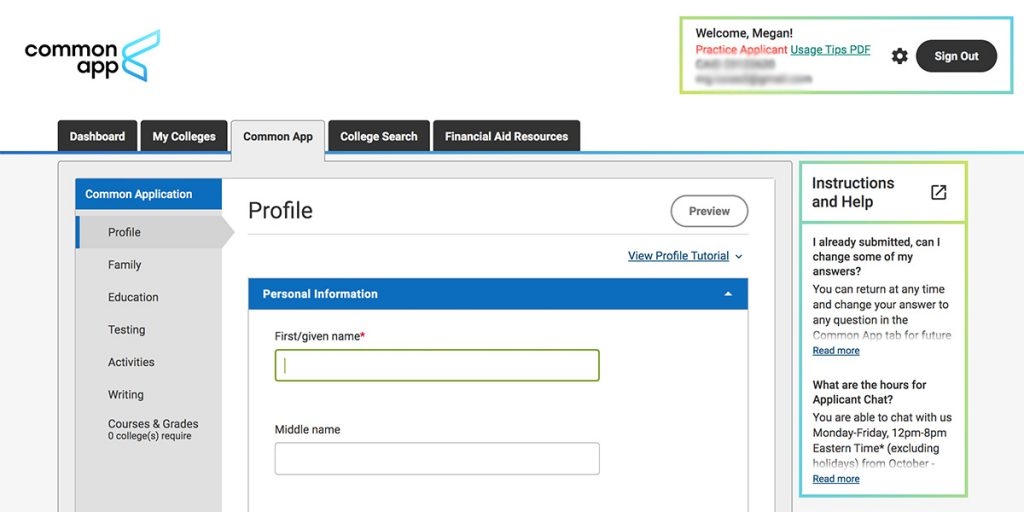What Does it MEAN? Figuring out College Applications & Other Options for Your Kid’s Future
Lifestyle
|
Oct 14, 2021
|
11 MIN READ

Image source: Keira Burton from Pexels
This is the second of a two-part series about that pressure-filled process many of our kids face as their school years come to an end: the college application process. Part two is addressing application terminology and options beyond college; part one is a helpful list of do’s and don’ts for parents who don’t want to lose their mind or their child.
By Zaiba Hasan
When going through the college application process, just learning the terms can be overwhelming and daunting. Sometimes you have to call in the professionals and glad that I have Salman Khan, founder of Muslim Campus Life to direct this conversation. I spoke with him for the 411 (the information) on the college application process.

The Common Application (Common App) is one of the primary ways in which you can apply to college. It is a centralized application that more than 900 colleges use. For example, instead of filling out your name and address for each college you want to apply to, you can just complete the Common App once for all the colleges that participate in this service.
The Common App has an essay, which is a pretty important one because it will go out to all the colleges you apply to (that use the Common App) in addition to whatever other essays your colleges require. Importantly, some colleges still do not accept the Common App, so you will have to apply to those colleges separately. For example, Georgetown University still does not accept the Common App, despite the fact that most of their peer colleges accept it.

Hot Tip: Many students do not realize that they can create a Common App account well before their senior year. If you want to get a sense of what colleges are looking for, create an account before your senior year and start exploring and completing the Common App earlier on! Make sure to check out the specific colleges you want to apply to, so you can get a sense of what questions/essays they require you to answer.
Early Decision vs. Early Action vs. Regular Decision vs. Rolling Admissions: Please explain!
Several colleges allow students to apply “early.” This allows colleges to alleviate some of their application load earlier on while also allowing select students to get their college acceptances much earlier in the year. The two ways in which you can apply early are called “Early Decision” (ED) and “Early Action” (EA). The primary difference between the two is that ED applications are typically binding. This means that you are committing to the university if you are accepted in their ED process. This also means that you can only apply to one university as an ED candidate.
EA applications, on the other hand, are non-binding and do not require students to commit to the universities they are accepted to. Both sets of applications are typically due between October 15th to November 15th. Check the specific colleges you may be interested in to find exactly when their early applications are due.
So why do EA and try to hit earlier deadlines? If you have a dream college that you absolutely want to attend, then you should definitely apply as an ED or EA candidate. It is no secret that colleges tend to have higher acceptance rates during the ED/EA cycles. For example, during last year’s application cycle, the University of Pennsylvania had a 14.9% acceptance rate during Early Decision. Their regular decision acceptance rate was 4.4%, less than a third of their ED rate (check for yourself)!
Applying early requires students to be prepared before the regular decision deadlines, which can be challenging. If you plan on applying early, make sure you have your affairs in order (request recommendation letters early on, start working on your college essay during the summer, etc.). You can do this!
If you go for regular admission, that’s getting your application down by the main deadline, which is typically early January for most colleges and universities. As for rolling admissions, colleges who do that (it’s not something you can choose) evaluate applications as they are received versus waiting to evaluate all applications after a hard deadline. Colleges that do rolling admission will evaluate applications until they’ve filled all the slots for their incoming class.

Image source: Element5 Digital on Unsplash
What should parents and their children look for when looking for colleges?
There are so many important factors to consider. I recommend you read the “Determining College Fit” section of the Muslim College Guide to learn more about this. In short, you want to find a college that will fit your academic, financial and social needs. Academic fit considers the majors available, opportunities for research, access to relevant faculty, and strength of career preparation resources. Financial fit considers the cost of attendance and returns on investment of a college (i.e. do most students graduate from College X with a job that will make their college degree worth it?).
For Muslim students, the social fit may consider the presence of a Muslim student body (or just students that look like them culturally or even just diversity broadly defined), availability of relevant clubs/extracurricular activities, access to a Muslim chaplain, access to halal food, proximity to home, flexible housing options (i.e. substance-free or single-sex dorms), campus size, prestige and much more. Social fit, in particular, is subjective to a student’s individual preferences, so it is very important for students to think about what factors are most relevant for them before they apply to specific colleges.
Hot Tip: Parents and students should discuss what factors they want to prioritize and find what selection of colleges fit those needs. Only visit colleges once you finalize the list of colleges that seem to fit your needs. Some families begin visiting colleges early on without a clear sense of what colleges have to offer. For some families, this can feel frustrating and time-consuming, because you will likely spend precious time visiting colleges that are not a great fit for your needs. Remember, the number one college may not be the number one college for you.
How should families apply for financial aid? Who qualifies for financial aid?
This is a very long and nuanced topic, but here is some general advice. The majority of students should complete the Free Application for Federal Student Aid (FAFSA). This is a federal application that gives students access to federal financial resources (grants and loans) to attend college depending on their financial situation. Completing the FAFSA should not take more than 15-30 minutes to complete and is completely FREE. You should never have to pay any type of fee to submit the FAFSA.

The application opens up on October 1 and should not be completed later than April 1st, although some states require the application to be submitted earlier in the year (check your state financial aid deadlines!). Importantly, states typically use the FAFSA to determine eligibility for state financial aid that may be available, so by applying for the FAFSA you will be considered for state financial aid too. (Bonus!)
If you are considering colleges that have larger endowments or “deeper pockets,” students should also apply to the College Scholarship Service (CSS) Profile. The CSS Profile gives students access to institutional aid, which is financial aid that specific colleges set aside for low-income students. Not all colleges provide institutional aid, so make sure you double check your college list with the list of participating colleges before applying to the CSS Profile.
Hot Tip: Some families advise their children not to apply for the FAFSA, because they believe they may not qualify. When in doubt, apply! The FAFSA takes both income and expenses into account, so it is not as simple as, “Our family makes $150,000/year and so we won’t qualify.” Depending on the number of dependents (children or grandparents in the home), assets, and other factors a student may be given financial aid to attend college, despite their parents making more than six figures a year.
There are tons of scholarships to be had as well. Be sure to check with your guidance counselor the summer before your senior starts to see what is out there for you.
Where are good places for families and students to seek help about all this?
Check out Muslim Campus Life and then download, share, and read the Muslim College Guide! It has tons of relevant information, including direct quotes from Muslim higher education staff and chaplains that work with college students on a regular basis. This guide should provide a strong foundation for any student and family beginning to explore the college process.
Talk to your guidance counselor and make sure you keep reaching out to them even if they do not reach out to you! Most counselors have large caseloads that they cannot handle due to institutional and hiring issues. Don’t let that be an excuse for why you do not get the support you need. Talk to your counselor ,and make it clear that you will not be a passive bystander through the college application process.
In a former life, Salman launched Hidayah Services to support Muslim students with the college application process through community workshops and individualized counseling. You can reach out to him there for specific questions.
**************

Hello readers! Zaiba here, back again!
Salman of Muslim Campus Life dropped a lot of great info in the interview above regarding the admissions process and financial aid. But we would be remiss in this brief series about the college application process if we didn’t discuss alternative paths to college or options that are out there that don’t require a standard four-year degree.
You always, always have options!
So what about an alternate path to college?
There is a pretty standard narrative around getting a college education: You get into a good school, work hard and graduate into a bright future. But that’s not always how it goes. First, maybe your child didn't get into their “dream” school. All is not lost! Consider some other options:
Transfer after the first year: You know those crazy college admissions stats you read about? Schools with 5.4 percent acceptance rates? That only applies to the first year. Let’s say your son or daughter didn’t get into any of the schools they really wanted to attend. They can still choose another school for their first year, rock the classes and then transfer into the school that they actually want to go to. Life is a long journey and there will be many bumps along the way. It’s how we deal with adverse situations that will make the difference between living a content and fulfilling life or constantly feeling like we are pushing a boulder uphill.
Community College: Perhaps your child didn’t do as well in high school as they might have liked, but they still want to pursue a college degree. Perhaps, after the FAFSA and seeking out other financial aid, affording a four-year college is still hard. Guess what? There are hundreds of local community colleges that offer amazing transfer programs to four-year colleges and universities. This route not only saves the family money but also allows a stepping-stone approach for some teens as they figure out what they want to do. Ultimately, if done correctly, they are still walking away with a college degree from a four-year school.
Also, college may not be for everyone.
There, I said it! I know that there may be some aunties reading this having slight heart palpitations and wondering why in the world I would even offer this view. However, some teens and young adults simply lack the desire to incur hundreds and thousands of dollars in debt in hopes that it will help them pursue a career that may or may not facilitate the life that they ultimately want.

I am here to tell you that it is a perfectly acceptable and often admirable quality to go against societal norms or to find a professional calling outside the MDs, JDs and MBAs that follow a lot of our names. As a parent, be prepared to have that conversation with your child in an open and nonjudgmental way. It is our responsibility to serve as a conduit of information and support, and the only way we can do that is by putting our own nafs (ego) aside and accepting that there are multiple ways to be “successful.”
Let’s look at some alternative scenarios.
Learn a Job: There are many jobs that require training but often no actual degree. For some of our children, this on-the-job training is what they are looking for. Here are just a few such jobs that offer great opportunities and pay:
- Commercial pilot
- Loan officer
- Web developer
- Graphic designer
- Medical assistant
- Optician
Pursuing a talent: Some of our children are gifted in a realm that doesn’t translate to traditional career choices. I personally have a friend whose daughter decided to defer college so that she could pursue her ballet career. It was a difficult decision for their entire family, but ultimately her daughter felt that if she didn’t take advantage of the opportunity to dance now, she would lose that opportunity in the future.
If that scares you as a parent, my suggestion is to make a plan with your child, give them a deadline for pursuing their creative passion (“If, after x years…”) and then, if they don’t fulfill what they set out to do, go ahead and start looking for collegiate alternatives.
The beauty of this plan is that you not only support your child’s journey but if they decide to go to college afterward, they are bringing with them the maturity and wisdom of having tried to do something out of the ordinary.

Trade school: Half my family is considered “blue-collar” and they are quite able to provide for their families. These jobs may not be flashy, but guess what? When my toilet has a leak, my JD/MBA hubby cannot help. Instead, I am desperate to find a plumber. Studies have shown that trade school-trained people have close to a 100% job placement rate. I have friends with PhDs still looking for work. So, don’t knock this valid option if it is a relevant one for your family.
Start a business: We all know that one friend of our children who has street smarts, innate hustle and drive to be successful. These are all great markers for entrepreneurial endeavors. We all have a family in our neighborhood – you know, the one with the HUGEST house and driveway full of flashy cars? He started a cab business that he scaled to epic proportions. What he lacks in educational background, he makes up for in grit and resilience and when I need to order up a car for a special occasion, he is the one I call.
Remember, we shouldn’t be comparing ourselves or our children to the “Khans.” Our kids are all on their own individual paths, and there are many ways to get to where they want. As parents, we need to be there to help guide our children, but we can’t actually walk those paths for them.
“Opportunity is missed by most people because it is dressed in overalls and looks like work.” - Thomas Edison
Until next time,
Zaiba
Zaiba Hasan is part of the dynamic duo behind the award-winning podcast, Mommying While Muslim. She is a spiritual parent coach at Emerge Parenting Solutions (launching January 2022), interfaith mediator and sports mama extraordinaire. Look for her on the baseball fields and basketball courts in the DMV (Washington, D.C.-Maryland-Virginia) area cheering from the sidelines.
Do you have a child applying for college or will be in a few years? How is the process going? Share with us in the comments below!
Subscribe to be the first to know about new product releases, styling ideas and more.
What products are you interested in?

